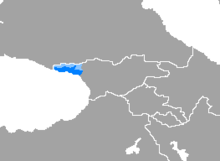Abkhazian language
| Abkhaz | |
|---|---|
| Abkhazian | |
| Аԥсуа бызшәа; аԥсшәа | |
| Native to | Abkhazia and Abkhaz diaspora |
| Ethnicity | Abkhazians |
|
Native speakers
|
113,000 (1993) |
|
Northwest Caucasian
|
|
| Dialects |
|
| Historically: Latin, Georgian | |
| Official status | |
|
Official language in
|
Republic of Abkhazia; Autonomous Republic of Abkhazia, Georgia |
| Language codes | |
| ISO 639-1 |
ab Abkhazian |
| ISO 639-2 |
abk Abkhazian |
| ISO 639-3 |
|
| Glottolog |
abkh1244 Abkhazian
|
 |
|
Abkhaz/æpˈhɑːz/ (sometimes spelled Abxaz; Аԥсуа бызшәа [apʰswa bɨzʃʷa]), also known as Abkhazian, is a Northwest Caucasian language most closely related to Abaza. It is spoken mostly by the Abkhaz people. It is one of the official languages of Abkhazia, Georgia, where around 100,000 people speak it. Furthermore, it is spoken by thousands of members of the Abkhazian diaspora in Turkey, Georgia's other autonomous republic of Adjara, Syria, Jordan and several Western countries. The Russian census of 2010 reported 6,786 speakers of Abkhaz in Russia.
Abkhaz is a Northwest Caucasian language and is therefore related to Adyghe. It is especially close to Abaza, and they are sometimes considered dialects of the same language, Abazgi, of which the literary dialects of Abkhaz and Abaza are simply two ends of a dialect continuum. Grammatically, the two are very similar; however, the differences in phonology are substantial and are the main reason for many other linguists preferring to keep the two separate. Most linguists (instance, Chirikba 2003) believe that Ubykh is the closest relative to the Abkhaz–Abaza dialect continuum.
...
Wikipedia
